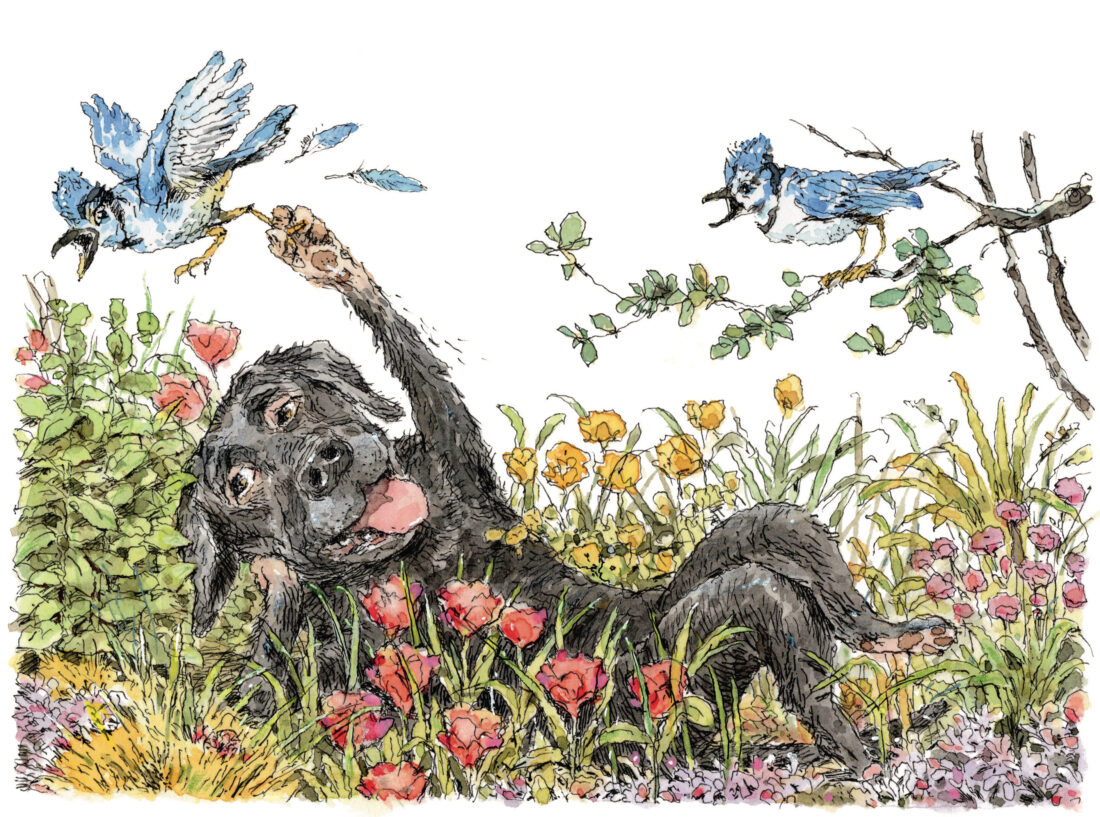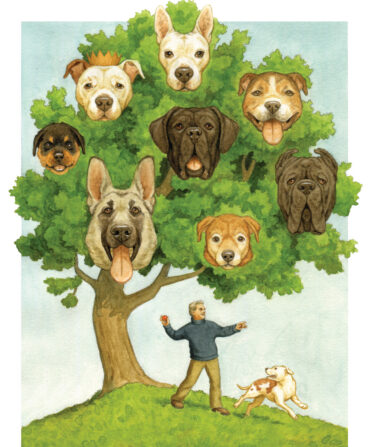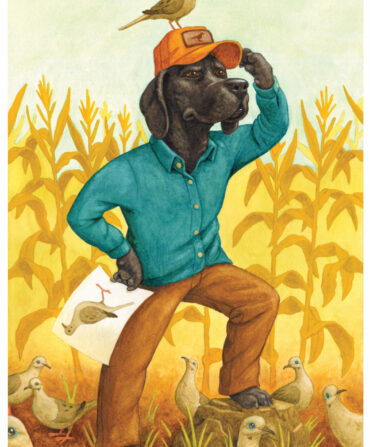The dog of my childhood shared a bloodline with the finest hunting dogs of his breed. Unfortunately, the closest Sparky came to hunting involved chasing noisy cars—he had an ear for VW Beetles—and rooting through garbage cans. Both appeared to be congenital talents. My memory insists he did catch a car once, barreling into its back panel and stunning both himself and the driver, but I might be mistaken.

The fact is we obtained Sparky to be a pet, not a gundog. He had the talent. Blue jays used to tease him in our front yard, swooping low between the oaks to taunt him. Sparky waited patiently for one to swoop too low, which one inevitably did.
But my father, Mobile born and bred, did not hunt. He spent thirteen months attached to his rifle in the Pacific during World War II, returned home with shrapnel lodged up and down his body, and never pulled a trigger again. His brother Max, on the other hand, loved to hunt. Uncle Max took me to shoot skeet once, long enough to determine that I would shoot a flying pig before I ever winged a clay pigeon.
Nonetheless, we owned a genuine black Lab of a certain time and place, that being the suburb of a midsize Southern city circa 1970. In the Mobile of that time, a wind shift reminded your nose that the city’s financial well-being gave off the sour, dank odor of two paper mills, may they rest in the peace of corporate consolidation. In Spring Hill, the neighborhood where I grew up, kids rode their bikes and didn’t lock them. Dogs went unfenced and unleashed. And, in Sparky’s case, pretty much untrained. He learned to sit. I don’t recall another command he mastered.
When I climbed aboard my purple three-speed, Sparky followed me everywhere, usually staying out of traffic. He accompanied me every weekday morning for the mile and a half to Mary B. Austin Elementary School. I would shove the front tire of my bike into the stand and ascend the stairs into class. Sparky would assume guard duty, trotting back and forth down the covered walkway, awaiting my return, until the principal, Flora Mary Pearson, would spot Sparky and call my mother to come fetch him.
Miss Pearson and my mother had taught school together years before. When I was well into my adulthood, Mom ran into an elderly Miss Pearson and called me to relay their conversation.
“She asked about you,” Mom began. My chest swelled. Principals have so many children in their charge, yet my academic prowess or maybe my writing career had been such that three decades later, Miss Pearson had inquired about me.
“Whatever became of your youngest child,” Miss Pearson asked, “the one who wouldn’t eat his lunch?”
My mother grew up in a family with dogs. My immigrant grandfather had two German shepherds whom he named Jack and Dempsey, befitting Grandpa’s pride in his adopted country’s boxing hero, and the dogs’ roles as guards for the family grocery. Jack and Dempsey didn’t come into the house, and Mom, as an adult, felt the same way about Sparky. He slept on the cold slab of the garage, or in the cool dirt of our flower beds, winter and summer. Sparky also served as unofficial mascot of neighborhood sporting events: Wiffle Ball, touch football, driveway basketball, and plastic-ball golf on the eighteen-hole course we designed in our yard and the neighboring empty lot.
In the summers, Sparky followed me on my bike rides to 7-Eleven for baseball cards and a Slurpee. He must have made the trip by himself on occasion. I say this because as I rode the two miles, and he raced through yard after yard alongside me, kids I didn’t know would greet him by name.
Sparky often took off on a walkabout, two, three, four days at a time, and nearly always found his way home. Once he went missing for two weeks, until we got a call from someone six miles away, halfway to downtown, that they had him. We went and fetched him, Sparky acting as if nothing unusual had taken place.
And then, in July 1971, on one of those stifling, air-so-thick-you-could-wring-it Gulf Coast summer weekends, four-year-old Sparky went missing. My family, including cousins visiting from Chicago, searched the neighborhood without success. We arrived home on Saturday afternoon only to find a black Lab, sprawled and lifeless, on the edge of our yard. It appeared that Sparky had chased one car too many.
What do you say to an eleven-year-old whose dog has died?
My father arrived home from the golf course and surveyed the situation: dead dog, inconsolable child, animal control closed on Saturday. He grabbed a shovel and went to work. At age forty-five, Daddy still had an athletic build. He dug a deep hole on the edge of our front yard in that July swelter and covered the body, and we said our goodbyes. I remember sitting on my bed that night, sobbing, my twenty-year-old visiting cousin trying in vain to soothe me.
I continued to mope for the next three days, until dinnertime on Tuesday. At that age, I entertained myself for hours by playing a baseball game in which I threw a rubber ball against the back wall of our garage, announcing the game as I played. I remember standing in the garage, near the back door, when up the driveway and into the shade trotted none other than Sparky: a little thinner, a lot tired, and even more hungry.
My father had lovingly laid to rest a black Lab. Just not ours.
My family has told and retold the story of the Resurrection of Sparky for years, embellishing here and maybe even there for comic effect, laughing harder and harder with every retelling. All of us except my father, who died sixteen years ago. I like to think that I inherited both his ability to tell a story and his sense of humor. But he never laughed about the resurrection the way the rest of us did.
Sparky lived only three more years, before heartworms, long the scourge of Southern dogs, took him down (he lived too soon for Heartgard). Sparky died at the vet’s office. My memory is that Daddy wasn’t there. I like to think he made Mom confirm the death. I never asked.









